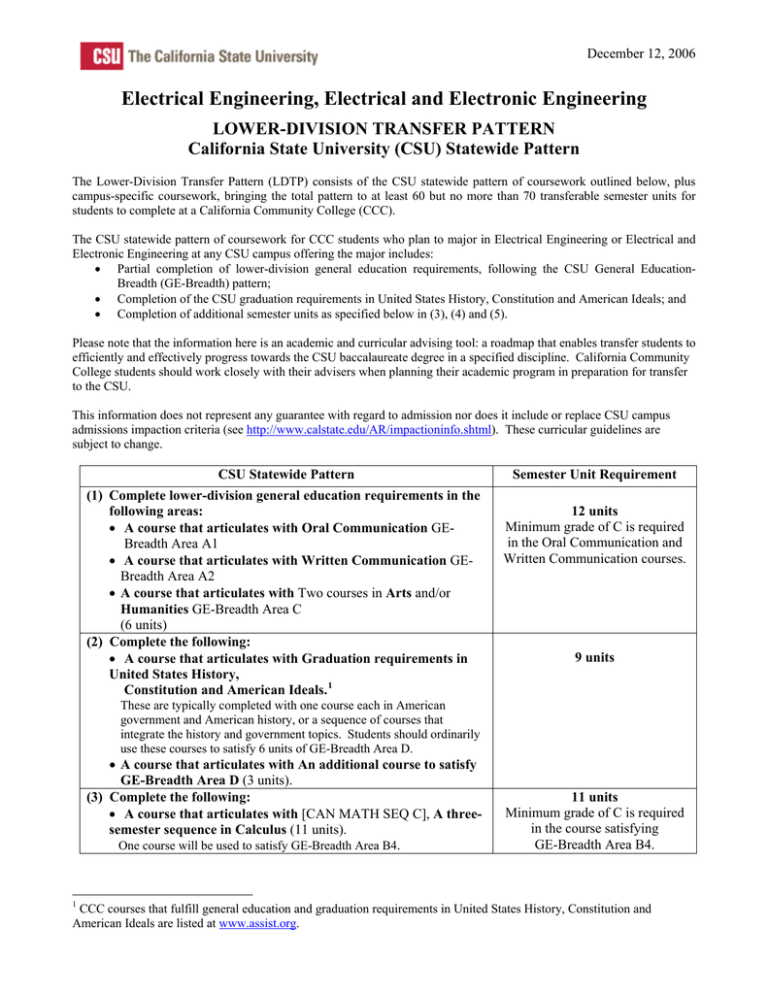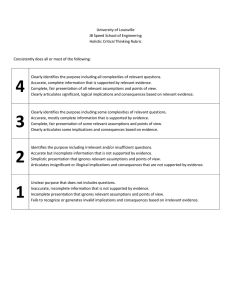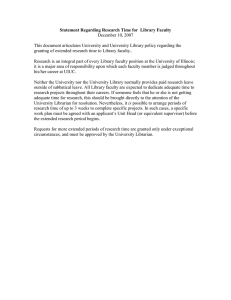Electrical Engineering, Electrical and Electronic Engineering
advertisement

December 12, 2006 Electrical Engineering, Electrical and Electronic Engineering LOWER-DIVISION TRANSFER PATTERN California State University (CSU) Statewide Pattern The Lower-Division Transfer Pattern (LDTP) consists of the CSU statewide pattern of coursework outlined below, plus campus-specific coursework, bringing the total pattern to at least 60 but no more than 70 transferable semester units for students to complete at a California Community College (CCC). The CSU statewide pattern of coursework for CCC students who plan to major in Electrical Engineering or Electrical and Electronic Engineering at any CSU campus offering the major includes: • Partial completion of lower-division general education requirements, following the CSU General EducationBreadth (GE-Breadth) pattern; • Completion of the CSU graduation requirements in United States History, Constitution and American Ideals; and • Completion of additional semester units as specified below in (3), (4) and (5). Please note that the information here is an academic and curricular advising tool: a roadmap that enables transfer students to efficiently and effectively progress towards the CSU baccalaureate degree in a specified discipline. California Community College students should work closely with their advisers when planning their academic program in preparation for transfer to the CSU. This information does not represent any guarantee with regard to admission nor does it include or replace CSU campus admissions impaction criteria (see http://www.calstate.edu/AR/impactioninfo.shtml). These curricular guidelines are subject to change. CSU Statewide Pattern (1) Complete lower-division general education requirements in the following areas: • A course that articulates with Oral Communication GEBreadth Area A1 • A course that articulates with Written Communication GEBreadth Area A2 • A course that articulates with Two courses in Arts and/or Humanities GE-Breadth Area C (6 units) (2) Complete the following: • A course that articulates with Graduation requirements in United States History, Constitution and American Ideals. 1 Semester Unit Requirement 12 units Minimum grade of C is required in the Oral Communication and Written Communication courses. 9 units These are typically completed with one course each in American government and American history, or a sequence of courses that integrate the history and government topics. Students should ordinarily use these courses to satisfy 6 units of GE-Breadth Area D. • A course that articulates with An additional course to satisfy GE-Breadth Area D (3 units). (3) Complete the following: • A course that articulates with [CAN MATH SEQ C], A threesemester sequence in Calculus (11 units). One course will be used to satisfy GE-Breadth Area B4. 1 11 units Minimum grade of C is required in the course satisfying GE-Breadth Area B4. CCC courses that fulfill general education and graduation requirements in United States History, Constitution and American Ideals are listed at www.assist.org. (4) Complete the following: • A course that articulates with [CAN PHYS 8], Physics (Calculus based—Mechanics) (4 units) • A course that articulates with [CAN PHYS 12], Physics (Calculus based—Electricity and Magnetism) (4 units). At least one of these courses must include a laboratory component, in order to satisfy GE-Breadth Area B3 as well as Area B1. (5) A course that articulates with Complete the following: • [CAN CSCI 22], Programming Concepts and Methodology I (3 units) • [CAN ENGR 12] Circuits (3 units) Total Semester Units Required for Statewide LDTP Pattern 8 units 6 units 46 Units Electrical Engineering, Electrical and Electronic Engineering LOWER-DIVISION TRANSFER PATTERN CSU Bakersfield Campus-Specific Pattern This campus does not have a major, concentration, or option in Electrical Engineering, Electrical and Electronic Engineering. Electrical Engineering, Electrical and Electronic Engineering LOWER-DIVISION TRANSFER PATTERN CSU Channel Islands Campus-Specific Pattern This campus does not have a major, concentration, or option in Electrical Engineering, Electrical and Electronic Engineering. Electrical Engineering, Electrical and Electronic Engineering LOWER-DIVISION TRANSFER PATTERN CSU Chico Campus-Specific Pattern In addition to the statewide pattern, the following is the CSU Chico campus-specific pattern: Campus-Specific Pattern If not taken as part of the statewide pattern (including general education and/or major preparation requirements), complete: • A course that articulates with Calculus III [CAN MATH 22] and • A course that articulates with [CAN ENGR 6], Circuits Lab and • A course that articulates with [CAN PHYS 16], Physics III and • A course that articulates with [CAN MATH 24], Differential Equations and • A course that articulates with Assembly Language Programming and • A course that articulates with Life Science (GE-Breadth Area B2) and • A course that articulates with [CSUC EECE 101], Introduction to Electrical and Computer Engineering - A survey of topics from the fields of electrical and computer engineering that also covers applications of critical thinking to the solution of engineering problems and using the computer and sensors to control mechanical devices. and • A course that articulates with [CAN CHEM 2], Chemistry Total Semester Units Required for CSU Chico Semester Unit Requirement 1 unit 1 unit 4 units 4 units 3 units 3 units 2 units 4 units 22 units Electrical Engineering, Electrical and Electronic Engineering LOWER-DIVISION TRANSFER PATTERN CSU Dominguez Hills Campus-Specific Pattern This campus does not have a major, concentration, or option in Electrical Engineering, Electrical and Electronic Engineering. Electrical Engineering, Electrical and Electronic Engineering LOWER-DIVISION TRANSFER PATTERN CSU East Bay Campus-Specific Pattern This campus does not have a major, concentration, or option in Electrical Engineering, Electrical and Electronic Engineering. Electrical Engineering, Electrical and Electronic Engineering LOWER-DIVISION TRANSFER PATTERN CSU Fresno Campus-Specific Pattern In addition to the statewide pattern, the following is the CSU Fresno campus-specific pattern: Campus-Specific Pattern If not taken as part of the statewide pattern (including general education and/or major preparation requirements), complete: • A course that articulates with [CSUF MATH 181], Differential Equations - Definition and classification of differential equations; general, particular, and singular solutions; existence theorems; theory and technique of solving certain differential equations: phase plane analysis, elementary stability theory; applications. and • A course that articulates with [CAN CHEM 2], Chemistry and • A course that articulates with [CSUF BIOL 10], Life Science How living things work and why they work that way. Biology from chemical and physical foundations to ecological and evolutionary processes. Biology and its relationship to human affairs. and • A course that articulates with [CSUF ECE 1], Introduction to Electrical and Computer Engineering - A course that covers the electrical and computer engineering professions, career opportunities and preparation, exposure to computer productivity tools, laboratory safety, and hands-on projects. and • A course that articulates with Digital Design with Lab and • A course that articulates with Static/Dynamics Total Semester Units Required for CSU Fresno Semester Unit Requirement 3 units 3 units 3 units 3 units 4 units 3 units 19 units Electrical Engineering, Electrical and Electronic Engineering LOWER-DIVISION TRANSFER PATTERN CSU Fullerton Campus-Specific Pattern In addition to the statewide pattern, the following is the CSU Fullerton campus-specific pattern: Campus-Specific Pattern If not taken as part of the statewide pattern (including general education and/or major preparation requirements), complete: • A course that articulates with Critical Thinking and • A course that articulates with [CAN MATH 24], Differential Equations and • A course that articulates with [CAN PHYS 14], Physics (Calculus-based) and • A course that articulates with [CAN CHEM 2], General Chemistry with Lab for Science Majors and • A course that articulates with Biology to satisfy GE • A course that articulates with [CAN ENGR 2], Graphics and • A course that articulates with [CAN ENGR 8], Statics and • A course that articulates with [CAN ENGR 6], Circuits with Lab Total Semester Units Required for CSU Fullerton Semester Unit Requirement 3 units 4 units 4 units 5 units 3 units 3 units 3 units 1 unit 26 units Electrical Engineering, Electrical and Electronic Engineering LOWER-DIVISION TRANSFER PATTERN Humboldt State University Campus-Specific Pattern This campus does not have a major, concentration, or option in Electrical Engineering, Electrical and Electronic Engineering. Electrical Engineering, Electrical and Electronic Engineering LOWER-DIVISION TRANSFER PATTERN CSU Long Beach Campus-Specific Pattern In addition to the statewide pattern, the following is the CSU Long Beach campus-specific pattern: Campus-Specific Pattern If not taken as part of the statewide pattern (including general education and/or major preparation requirements), complete: • A course that articulates with Third Semester Physics [CAN PHYS 14] and • A course that articulates with [CAN MATH 24], Introduction to Differential Equations and • A course that articulates with [CAN ENGR 6], Electrical Circuit Lab and • A course that articulates with Critical Thinking (GE-Breadth Area A3) and • A course that articulates with a GE course in either Life Science with laboratory or Category E and • A course that articulates with [CAN MATH 22], One additional unit for Calculus, 3rd Semester Total Semester Units Required for CSU Long Beach Semester Unit Requirement 4 units 3 units 1 unit 3 units 3-4 units 1 units 15-16 units Electrical Engineering, Electrical and Electronic Engineering LOWER-DIVISION TRANSFER PATTERN CSU Los Angeles Campus-Specific Pattern In addition to the statewide pattern, the following is the CSU Los Angeles campus-specific pattern: Campus-Specific Pattern If not taken as part of the statewide pattern (including general education and/or major preparation requirements), complete: • A course that articulates with [CAN MATH 24], Introduction to Differential Equations and • A course that articulates with [CAN PHYS 14], Physics (Calculusbased) and • A course that articulates with [CAN CHEM 2], General Chemistry with Lab for Science Majors and • A course that articulates with [CAN ENGR 8], Statics and • A course that articulates with A second semester of expository writing that emphasizes exposition, research, and critical thinking, typically called “Writing and Critical Thinking” (as opposed to “Literature and Composition”) and • A course that articulates with GE-Breadth Area E and • A course that articulates with GE-Breadth Area C Total Semester Units Required for CSU Los Angeles Semester Unit Requirement 3 units 3 units 3 units 3 units 3 units 3 units 3 units 21 units Electrical Engineering, Electrical and Electronic Engineering LOWER-DIVISION TRANSFER PATTERN California Maritime Academy Campus-Specific Pattern This campus does not have a major, concentration, or option in Electrical Engineering, Electrical and Electronic Engineering. Electrical Engineering, Electrical and Electronic Engineering LOWER-DIVISION TRANSFER PATTERN CSU Monterey Bay Campus-Specific Pattern This campus does not have a major, concentration, or option in Electrical Engineering, Electrical and Electronic Engineering. Electrical Engineering, Electrical and Electronic Engineering LOWER-DIVISION TRANSFER PATTERN CSU Northridge Campus-Specific Pattern In addition to the statewide pattern, the following is the CSU Northridge campus-specific pattern: Campus-Specific Pattern If not taken as part of the statewide pattern (including general education and/or major preparation requirements), complete: • A course that articulates with [CAN MATH 24], Fourth Semester Calculus and • A course that articulates with CAN MATH SEQ C (1 unit)and • A course that articulates with [CAN CHEM 2], Chemistry and • A course that articulates with [CAN ENGR 6], Electrical Circuits lab • A course that articulates with [CAN ENGR 4], Engineering Materials Total Semester Units Required for CSU Northridge Semester Unit Requirement 4 units 1 unit 5 units 1 unit 3 units 14 units Electrical Engineering, Electrical and Electronic Engineering LOWER-DIVISION TRANSFER PATTERN Cal Poly Pomona Campus-Specific Pattern In addition to the statewide pattern, the following is the Cal Poly Pomona campus-specific pattern: Campus-Specific Pattern If not taken as part of the statewide pattern (including general education and/or major preparation requirements), complete: • A course that articulates with GE-Breadth Area C3 and • A course that articulates with GE-Breadth Area D3 and • A course that articulates with GE-Breadth Area E and • A course that articulates with [CPP MAT 224], Elementary Linear Algebra and Differential Equations - A course that covers separable and linear ordinary differential equations; numerical and analytical solutions, vectors in n-space, matrices, linear transformations, eigenvalues, eigenvectors, diagonalization; applications to the study of systems of linear differential equations. and • A course that articulates with [CPP CHM 121], General Chemistry - A course that covers atomic theory of structure and bonding, chemical equations, gas laws, oxidation-reduction, electrochemistry, states of matter, equilibrium, acids and bases, thermodynamics and reaction kinetics and their applications to chemistry, physics, and engineering science. with • A course that articulates with [CPP CHM 121L], General Chemistry Laboratory A lab course that conducts experiments in basic quantitative analysis techniques, gas measurement, acidbase, pH, and redox titrations, electrochemistry, kinetics, thermodynamics, and ionic equilibria and qualitative analysis procedures. and • A course that articulates with [CPP BIO 110], Life Science - A course that covers the basic concepts in the study of living systems, including human beings; uses the study of biology to illustrate approaches of science in understanding the universe; with the role of science in modern society and the impact of human civilization on other organisms considered. Total Semester Units Required for Cal Poly Pomona Semester Unit Requirement 3 units 3 units 3 units 3 units 3 units 1 unit 2-3 units 18-19 units Electrical Engineering, Electrical and Electronic Engineering LOWER-DIVISION TRANSFER PATTERN CSU Sacramento Campus-Specific Pattern In addition to the statewide pattern, the following is the CSU Sacramento campus-specific pattern: Campus-Specific Pattern If not taken as part of the statewide pattern (including general education and/or major preparation requirements), complete: • A course that articulates with [CAN CHEM 2], General Chemistry and • A course that articulates with [CAN MATH 24], Differential Equations and • A course that articulates with Life Science (GE-Breadth Area B2) and • A course that articulates with GE-Breadth Area C Total Semester Units Required for CSU Sacramento Semester Unit Requirement 5 units 3 units 3 units 3 units 14 units Electrical Engineering, Electrical and Electronic Engineering LOWER-DIVISION TRANSFER PATTERN CSU San Bernardino Campus-Specific Pattern This campus does not have a major, concentration, or option in Electrical Engineering, Electrical and Electronic Engineering. Electrical Engineering, Electrical and Electronic Engineering LOWER-DIVISION TRANSFER PATTERN San Diego State University Campus-Specific Pattern In addition to the statewide pattern, the following is the San Diego State University campus-specific pattern: Campus-Specific Pattern (1) If not taken as part of the statewide pattern (including general education and/or major preparation), complete: • A course that articulates with Intermediate Composition/Critical Thinking (GE-Breadth, Area 3) and • A course that articulates with Life Science (GE-Breadth, Area B2) • A course that articulates with . [SDSU PHYS 195L or 196L], Principles of Physics Laboratory. Complete whichever lab was not taken as part of the statewide pattern. and • A course that articulates with Humanities (GE-Breadth, Area C) • A course that articulates with [SDSU MATH 254], Introduction to Linear Algebra - Matrix algebra, Gaussian elimination, determinants, vector spaces, linear transformations, orthogonality, eigenvalues, and eigenvectors. • A course that articulates with [SDSU ENGR 280], Methods of Analysis - Selected topics from ordinary differential equations, the Laplace transform, Fourier series, and linear algebra, with engineering applications. If students take more units beyond 60 (but not more than 70), they may complete the following courses at their community college to meet SDSU's major preparation requirements: • A course that articulates with [SDSU COMPE 270], Digital Systems – A course that covers modeling, analysis and design of digital systems, primarily at the logic design level. Cominational and sequential networks. • A course that articulates with [SDSU COMPE 271], Computer Organization – A course that covers organization and operation of computer hardware and software. Operating system shell and services. Program design and development. Input-output programming. Multi-module and mixed-language programming. Assembler and C language. Total Semester Units Required for San Diego State Semester Unit Requirement 3 units 3 units 1 unit 3 units 3 units 3 units 3 units 3 units 16 units Electrical Engineering, Electrical and Electronic Engineering LOWER-DIVISION TRANSFER PATTERN San Francisco State University Campus-Specific Pattern In addition to the statewide pattern, the following is the San Francisco State University campus-specific pattern: Campus-Specific Pattern If not taken as part of the statewide pattern (including general education and/or major preparation requirements), complete: • A course that articulates with [CAN MATH 24 and CAN MATH 26], Differential Equations and Linear Algebra and • A course that articulates with [CAN PHYS 14], Physics (Calculusbased) and • A course that articulates with [CAN CHEM 2], General Chemistry with Lab for Science Majors and • A course that articulates with [SFSU ENGR 100], Introduction to Engineering - A course that describes the major engineering fields and their subfields; day to day activities of engineers; engineering professionalism, ethics, communication skills, lifelong learning and career planning. with • A course that articulates with [SFSU ENGR 106], Introduction to Engineering Lab - A project based laboratory that covers basic measuring tools; MatLab, spreadsheet, and word processing software; recording, importing, and plotting various data to incorporate into engineering reports; and developing hands-on experience with basic software tools. • A course that articulates with [CAN ENGL 2, SFSU ENG 114], College Composition, 1st semester and [CAN ENGL 4, SFSU ENG 214], College Composition and Literature, 2nd semester should be completed as part of the units for general education in the statewide pattern. Total Semester Units Required for San Francisco State University Semester Unit Requirement 3 units 4 units 5 units 1 unit 1 unit 0-6 units 20 units Electrical Engineering, Electrical and Electronic Engineering LOWER-DIVISION TRANSFER PATTERN San Jose State University Campus-Specific Pattern In addition to the statewide pattern, the following is the San Jose State University campus-specific pattern: Campus-Specific Pattern If not taken as part of the statewide pattern (including general education and/or major preparation requirements), complete: • A course that articulates with [CAN MATH 24], Differential Equations and • A course that articulates with [CAN CHEM 1A], Chemistry and • A course that articulates with [CAN PHYS 14], Physics and • A course that articulates with [CAN PHYS 16], Physics and • A course that articulates with [SJSU EE 097], Circuits Lab - A course that covers basic instruments and experimental techniques in electrical engineering; oscilloscopes, function generators, frequency counters and multiple-use meters; measurements of voltage, current, frequency response, transient response and computer simulation of circuits. and • A course that articulates with [SJSU ENGR 010], Introduction to Engineering - An introduction to engineering through hands-on design projects, case studies, and problem-solving using computers; introduction to engineering profession and development of communication skills, team skills, and how to deal with ethical dilemmas. Total Semester Units Required for San Jose State University Semester Unit Requirement 3 units 5 units 3 units 3 units 1 unit 3 units 18 units Electrical Engineering, Electrical and Electronic Engineering LOWER-DIVISION TRANSFER PATTERN Cal Poly San Luis Obispo Campus-Specific Pattern In addition to the statewide pattern, the following is the Cal Poly San Luis Obispo campus-specific pattern: Campus-Specific Pattern If not taken as part of the statewide pattern (including general education and/or major preparation requirements), complete: • A course that articulates with [CAN MATH 22], Math and • A course that articulates with [CAN PHYS 14], Physics and • A course that articulates with Physics [CAN PHYS 16], Modern and • A course that articulates with [CAN CHEM 2], Chemistry with Lab and • A course that articulates with [SLO ENGR 110], Engineering Science I - An introduction to engineering and computer science that covers graphical communication and visualization as well as engineering orientation. and • A course that articulates with[CAN ENGR 4], Engineering Materials or a programming course. Total Semester Units Required for Cal Poly San Luis Obispo Semester Unit Requirement 4 units 4 units 3 units 4 units 3 units 3 units 21 units Electrical Engineering, Electrical and Electronic Engineering LOWER-DIVISION TRANSFER PATTERN CSU San Marcos Campus-Specific Pattern This campus does not have a major, concentration, or option in Electrical Engineering, Electrical and Electronic Engineering. Electrical Engineering, Electrical and Electronic Engineering LOWER-DIVISION TRANSFER PATTERN Sonoma State University Campus-Specific Pattern In addition to the statewide pattern, the following is the Sonoma State University campus-specific pattern: Campus-Specific Pattern If not taken as part of the statewide pattern (including general education and/or major preparation requirements), complete: • A course that articulates with [SSU MATH 241], Introduction to Differential Equations and Linear Algebra - A course in vector and matrix algebra applied to the study of differential equations with topics including vectors and matrices, linear independence, spanning, bases, linear transformations, first order differential equations and linear systems, phase planes, geometric and numerical methods. and • A course that articulates with [CAN CSCI 24], Programming Concepts and Methodology II and • A course that articulates with [CAN CSCI 26], Discrete Math • A course that articulates with [SSU ES 221], Electric Circuits Lab - Laboratory work on materials covered in an Electrical Circuits course emphasizing elementary design principles. and • A course that articulates with [SSU ES 330], Electronics II with Lab - A course that executes an analysis and design of high frequency amplifiers; high frequency models of transistors; operational amplifiers and applications; feedback amplifiers; oscillators, modulators, bandpass amplifiers, and demodulators for communications. Total Semester Units Required for Sonoma State University Semester Unit Requirement 3 units 3 units 3 units 1 unit 4 units 14 units Electrical Engineering, Electrical and Electronic Engineering LOWER-DIVISION TRANSFER PATTERN CSU Stanislaus Campus-Specific Pattern This campus does not have a major, concentration, or option in Electrical Engineering, Electrical and Electronic Engineering.



